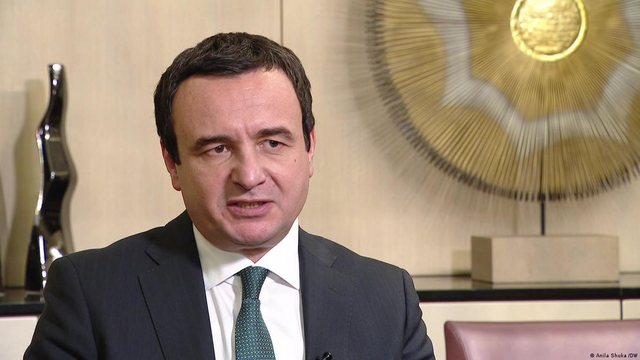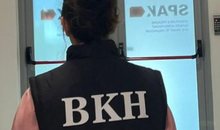
 Flash News
Flash News
Kurti: The self-management of the Serbian community in Kosovo is neither self-government nor self-administration

The Prime Minister of Kosovo, Albin Kurti, said that the self-management of the Serbian community in Kosovo, foreseen in the recently reached Kosovo-Serbia agreement, does not mean self-administration.
He made these statements while reporting on Thursday in the Assembly of Kosovo regarding the Kosovo-Serbia agreement, for which both countries reached an agreement on March 18 in Ohrid, North Macedonia.
He responded to the opposition's criticism regarding point 7 of this agreement, which provides for "ensuring an appropriate level of self-management for the Serbian community in Kosovo."
"Self-management is neither self-governance nor self-administration" , Kurti said, asking opposition MPs not to use "extreme notions".
Prime Minister Kurti told the deputies that the Kosovo-Serbia agreements reached by previous governments cannot be avoided.
In the agreement reached on March 18 in Ohrid, it is specified that both states must implement all agreements reached in the past.
This also includes the establishment of an Association of municipalities with a Serbian majority, the agreement for which was reached in 2013 and specified in 2015.
This agreement, which was never implemented until now, was strongly opposed by Kurti even while he was in the opposition.
"Our allies remind us that agreements have been reached between the governments of our countries, with lasting obligations even when governments change. If we want to be treated as a state and be recognized as such, I cannot avoid the obligations from the international treaties that we conclude ," he said.
Further, Kurti reiterated that he will commit that there will not be an executive power between the central and local level in Kosovo, through this association.
"We will consider everything from the prism of our Constitution, of our legality" , he said.
On February 27, Kosovo and Serbia agreed on the Agreement towards normalization, otherwise known as the European proposal. Meanwhile, on March 18, the parties agreed on the Annex for the implementation of this agreement.
Palët nuk e nënshkruan marrëveshjen, por BE-ja dhe Shtetet e Bashkuara kanë thënë se pavarësisht se nuk është nënshkruar, ajo është marrëveshje e obligueshme për palët.
Kurti e quajti këtë marrëveshje “tekstin më të mirë që ka mundur të arrihet tani për tani”.
“Ia vlen mundimi pasi arritëm diçka të rëndësishme dhe të pakthyeshme”, tha ai.
Kurti, megjithatë, tha se nuk pret që rruga përpara për zbatimin e kësaj marrëveshjeje do të jetë e lehtë.
“Do të ketë shumë kurthe e ndërskamca. Serbia do të bëjë gjithçka që është e mundur, përfshirë injorimin haptas të marrëveshjes, anulimin e interpretimin e riinterpretimin e asaj për të cilën tashmë kemi rënë dakord”, tha Kurti.
Opozita me kritika për "transformimin e Kurtit" karshi Asociacionit
Memli Krasniqi, kryetar i Partisë Demokratike të Kosovës, parti opozitare, e kritikoi Kurtin për zbrapsje nga qëndrimet e tij, sidomos sa i përket Asociacionit.
“Kryeministri i Kosovës me një fjali mbrëmë e ka përmbysur të gjithë jetën e tij politike. Po, ka Asociacion dhe ka pasur Asociacion sa herë që ky ka thënë që nuk ka asociacion”, tha Krasniqi.
Sipas Krasniqit, me marrëveshjen në Ohër Kurti “ka rrezikuar t’u japë autonomi politike serbëve të Kosovës”.
Edhe Lumir Abdixhiku, kryetar i partisë opozitare Lidhja Demokratike e Kosovës, e kritikoi Kurtin në lidhje me pranimin e Asociacionit në marrëveshjen e Ohrit, pa i përfillur kushtet e tij që i kishte vënë në fillim të muajit shkurt.
Një ndër kushtet që e përmendura nga Kurti ishte që Asociacioni të jetë pjesë e marrëveshjes finale dhe të zbatohet vetëm pas njohjes reciproke.
“Ndiej keqardhje për të mashtruarit, të përdorurit, të shfrytëzuarit dhe mbi të gjitha për humbjen e kohës së Republikës së Kosovës”, tha Abdixhiku.
Në anën tjetër, Besnik Tahiri, deputet nga Aleanca për Ardhmërinë e Kosovës, parti kjo po ashtu opozitare, tha se me marrëveshjen e Ohrit dialogu dhe diskutimi me Bashkimin Evropian do të vazhdojë me vite.
“Për ne kjo duhet të përdoret si mundësi e forcimit të shtetit të Kosovës, por është edhe një potencial për gabime dhe lëshime”, tha Besnik Tahiri, i cili sugjeroi që në komitetin që monitoron zbatimin e marrëveshjeve të përfshihen edhe Shtetet e Bashkuara të Amerikës.
We recall that the agreement, of 11 articles, does not specifically mention mutual recognition. However, the document requires both countries to accept each other's documents and symbols, including: passports, diplomas and license plates.
The document also requires the parties to implement all the agreements reached so far in the dialogue for the normalization of relations, including the one for the formation of the Association of municipalities with a Serbian majority in Kosovo, which the Government in Pristina has rejected until now, on the grounds that it could endanger the functionality of the state. /REL
Latest news


Two vehicles collide on the Elbasan-Peqin axis, drivers injured
2025-07-05 19:26:29

What does Zelenskyy have more than Zegjineja?
2025-07-05 18:45:26

Fiscal peace, but at a cost
2025-07-05 18:00:10
'Bankers' tax evasion, Chinese CEO and former director jailed
2025-07-05 17:39:21
Kyle Walker joins English club on two-year deal
2025-07-05 17:20:24
Two cars collide on the Saranda-Delvina axis, 4 injured
2025-07-05 17:05:29
Touching gesture! Liverpool will pay Jota's family's salary until 2027
2025-07-05 16:45:18
The zodiac signs that cheat most often
2025-07-05 16:25:53

"I asked for the dismissals", Dredha tries to soften Rama's 'blow' in Vlora
2025-07-05 15:48:49
Bomb threat in Parliament, prosecutor: It was a lie
2025-07-05 15:22:28

Bardhi: The recount revealed how greedy Zeqine Balluku is in stealing
2025-07-05 14:44:29
Knife wound on the secondary road Tirana-Durrës, perpetrator sought
2025-07-05 14:37:54
Tears and pain, Diogo Jota is escorted to his final home
2025-07-05 14:21:34
Success starts with yourself! Simple ways to invest in personal development
2025-07-05 13:58:50
Unlicensed firearms found in apartment, 50-year-old arrested in Lushnje
2025-07-05 13:43:11

Tirana Court remands Skerdi Sina to prison
2025-07-05 12:59:34
Cocaine laboratory in Greece, here are the Albanians arrested and wanted
2025-07-05 12:40:16
Directed Justice/Vangjeli: SPAK does not investigate any scandal involving Rama
2025-07-05 12:22:03

Bomb alert, Police remove MPs and media from Kosovo Parliament building
2025-07-05 11:48:16
"The will of the people" and the irony of ordered resignations
2025-07-05 11:32:05
Summer drowning risk: How to enjoy the water without risking your life
2025-07-05 11:20:27
Fire situation in the country, 16 fires reported in 24 hours, 4 still active
2025-07-05 11:07:04
Car hits pedestrian at white lines, injured in serious condition in Vlora
2025-07-05 10:59:58
Mosquito-borne diseases are a growing problem in Europe
2025-07-05 10:44:13



One of Sweden's most dangerous and wanted criminals arrested in Turkey
2025-07-05 09:38:29
Foreign exchange/ How much foreign currencies are bought and sold today
2025-07-05 09:18:38

"Don't be influenced by the opinions of others", today's horoscope
2025-07-05 08:40:50

Morning Post/ In 2 lines: What mattered yesterday in Albania
2025-07-05 08:02:07

Trump says he's ready to raise tariffs to 70% on some countries
2025-07-04 22:35:52
Tre shenjat e zodiakut që do ‘pasurohen’ në Korrik
2025-07-04 22:05:09
Gaza War: Hamas Accepts US Proposal for 60-Day Ceasefire
2025-07-04 21:50:10
Autocracy in Albania, Fuga: Governance has gotten out of control
2025-07-04 21:40:51
Meta: Agriculture on credit, the new fraud!
2025-07-04 21:26:39




Vote recount in Durrës ends without changes
2025-07-04 20:12:54
Gas station explodes in Rome, 25 injured (VIDEO)
2025-07-04 20:00:20

These afternoon habits often sabotage weight loss
2025-07-04 19:39:28
Former Arsenal player Thomas Partey accused of rape
2025-07-04 19:24:21
Shepherd disappears without a trace in Delvina
2025-07-04 19:14:31

Bardho gave Zegjine's mandate/Braho: Unfair! It violates the electoral system
2025-07-04 19:01:08


Rapid developments in the Sultanates!
2025-07-04 18:00:06



Italy tightens rules for skateboard traffic
2025-07-04 17:20:18

Unusual for the time, dense fog covers the coast of Vlora
2025-07-04 16:48:01


Accident on the Shkodra-Lezhë axis, one dead and 3 injured
2025-07-04 16:14:19
Albania with fewer requests for asylum and Albanian citizenship in 2024
2025-07-04 16:06:57

Albania last for quality of life, DP: Technical government is the solution!
2025-07-04 15:42:30
Nico Williams says "No" to Barcelona, signs with Athletic Club until 2035
2025-07-04 15:33:35
Fires in the country, four fires are still active, what is the situation?
2025-07-04 15:24:20

Summer brings big changes for these 4 zodiac signs
2025-07-04 15:00:04
Osmani: MPs need to agree to a secret ballot for the Speaker of Parliament
2025-07-04 14:51:09
Serious accident on the Peqin-Elbasan axis, two injured
2025-07-04 14:37:56

GJKKO leaves in force the security measure for the head of the KPP
2025-07-04 13:58:17
Who will replace Ilir Meta and take over the leadership of the PL?
2025-07-04 13:50:36
Berisha: Dismissal of directors in Vlora, another act of 'scapegoats'
2025-07-04 13:41:46




Librazhd/ In a serious psychological state, the young man consumes pesticides
2025-07-04 13:05:07


Weapons trafficked from Kosovo to Albania, two arrested, 8 pistols seized
2025-07-04 12:33:28
Konsumimi i tepërt i çokollatës, ja cilat janë dëmet që shkakton në organizëm
2025-07-04 12:23:35

Fires in the country, 21 fires in the last 24 hours, 4 still active
2025-07-04 12:00:19
WB calls for debt transparency: Albania to publish details of every loan
2025-07-04 11:50:05
Changes in the State Police, new names expected to lead 5 police stations
2025-07-04 11:40:06

The race for the head of the BKH, the third phase on July 11
2025-07-04 11:20:23

